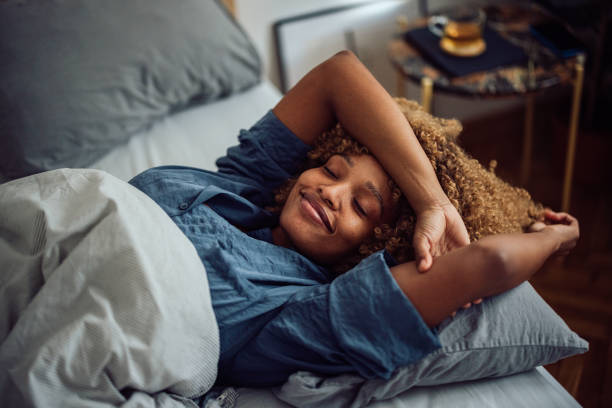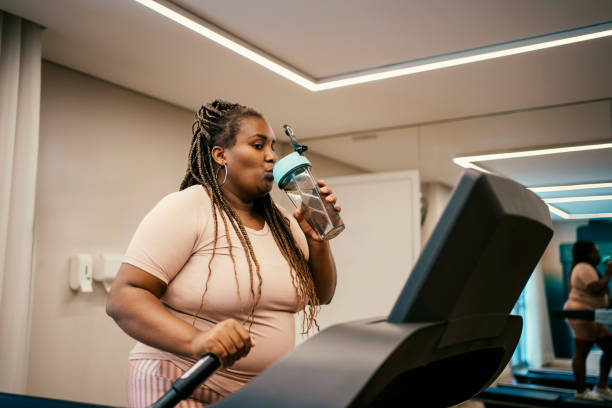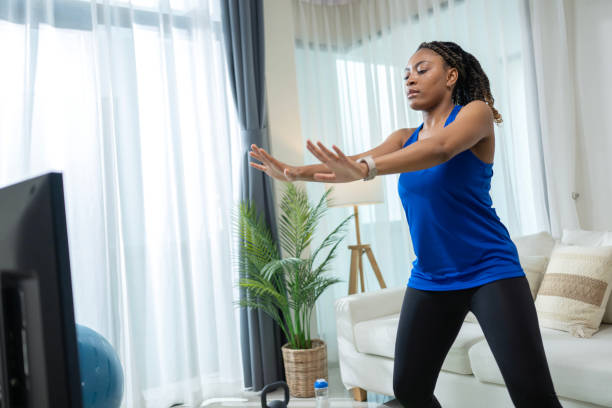(BlackFitness101.com) As a fitness trainer with years of experience working with women over 40, I understand the unique challenges they face when it comes to maintaining a healthy lifestyle. One of the most crucial yet often overlooked aspects of health is sleep. Quality sleep is essential for physical recovery, mental well-being, and overall vitality. However, as women age, hormonal changes, stress, and other factors can disrupt sleep patterns. Here are six must-know sleep hacks that can help women over 40 achieve better rest and improve their overall health.
1. Create a Relaxing Bedtime Routine
Establishing a consistent and relaxing bedtime routine is crucial for signaling to your body that it’s time to wind down. This routine should start at least an hour before you plan to go to sleep and include activities that promote relaxation. Here are some tips:
Limit Screen Time
The blue light emitted by phones, tablets, and computers can interfere with your body’s natural sleep-wake cycle by suppressing the production of melatonin, the hormone responsible for regulating sleep. Aim to turn off all electronic devices at least an hour before bedtime.
Practice Relaxation Techniques
Engage in relaxation techniques such as deep breathing exercises, progressive muscle relaxation, or guided meditation. These practices can help reduce stress and prepare your mind and body for sleep.
Take a Warm Bath
A warm bath can help relax your muscles and increase your body temperature. As your body cools down after the bath, it can create a sensation of drowsiness, making it easier to fall asleep.
Read a Book
Reading a physical book (not an e-book) can be a calming activity that helps take your mind off the day’s stresses. Choose light, enjoyable reading material to avoid overstimulating your brain.

2. Optimize Your Sleep Environment
Creating a sleep-conducive environment is essential for promoting quality rest. Pay attention to factors such as room temperature, lighting, and noise levels.
Keep Your Room Cool
A cooler room temperature, typically between 60-67 degrees Fahrenheit, is ideal for sleep. Consider using a fan, air conditioner, or an open window to maintain a comfortable temperature.
Invest in Comfortable Bedding
Your mattress and pillows play a significant role in sleep quality. Choose a mattress that supports your body type and sleeping position. Similarly, invest in pillows that provide adequate support for your neck and head.
Darken the Room
Ensure your bedroom is as dark as possible. Use blackout curtains or shades to block out external light, and consider an eye mask if necessary. Darkness promotes the production of melatonin, helping you fall asleep faster.
Reduce Noise
Minimize noise disruptions by using earplugs or a white noise machine. Alternatively, a fan can also serve as a source of white noise, drowning out any disruptive sounds.
3. Pay Attention to Your Diet
What you eat and drink can significantly impact your sleep quality. Here are some dietary tips to consider:
Limit Caffeine and Alcohol
Caffeine is a stimulant that can interfere with your ability to fall asleep. Avoid consuming caffeine-containing beverages like coffee, tea, and soda in the late afternoon and evening. While alcohol might make you feel drowsy initially, it can disrupt your sleep cycle and reduce sleep quality. Try to limit alcohol consumption, especially close to bedtime.
Eat Light in the Evening
Heavy meals close to bedtime can cause discomfort and indigestion, making it difficult to fall asleep. Opt for a light, balanced dinner at least 2-3 hours before bedtime. If you need a snack, choose something light and easy to digest, like a small piece of fruit or a handful of nuts.
Stay Hydrated
Dehydration can lead to restless sleep and frequent waking. Make sure to drink enough water throughout the day, but try to reduce fluid intake in the evening to avoid nighttime trips to the bathroom.
Include Sleep-Promoting Foods
Some foods contain nutrients that promote sleep. Consider incorporating foods rich in tryptophan (such as turkey, chicken, and dairy), magnesium (such as leafy greens, nuts, and seeds), and melatonin (such as cherries and tomatoes) into your diet.
4. Exercise Regularly, but Smartly
Regular physical activity is beneficial for overall health and can promote better sleep. However, the timing and intensity of exercise can affect your sleep patterns.
Morning or Afternoon Workouts
Exercising in the morning or afternoon can help regulate your circadian rhythm and improve sleep quality. Morning sunlight exposure can also help synchronize your internal clock.
Avoid Late-Night Vigorous Exercise
While regular exercise is important, vigorous workouts close to bedtime can have the opposite effect by increasing your heart rate and stimulating your nervous system. Aim to finish high-intensity workouts at least a few hours before bed.
Incorporate Relaxing Activities
In addition to your regular exercise routine, consider incorporating relaxing activities such as yoga or tai chi. These practices can help reduce stress and promote relaxation, making it easier to fall asleep.
5. Manage Stress and Anxiety
Stress and anxiety are common culprits of sleep disturbances. Developing effective stress management techniques can significantly improve your sleep quality.
Practice Mindfulness and Meditation
Mindfulness and meditation practices can help calm your mind and reduce stress. Consider setting aside time each day for mindfulness exercises or guided meditation sessions.
Keep a Sleep Journal
Writing down your thoughts and worries before bed can help clear your mind and reduce anxiety. A sleep journal can also help you track your sleep patterns and identify any factors that may be contributing to poor sleep.
Set Realistic Goals
Setting realistic goals and managing your expectations can help reduce stress. Break down large tasks into smaller, manageable steps, and prioritize self-care.
Seek Professional Help if Needed
If stress and anxiety are significantly impacting your sleep and daily life, consider seeking help from a mental health professional. Therapy and counseling can provide valuable tools and support for managing stress and improving sleep.
6. Address Hormonal Changes
Hormonal fluctuations, particularly during perimenopause and menopause, can disrupt sleep patterns for many women over 40. Understanding and addressing these changes can help improve sleep quality.
Understand Menopausal Symptoms
Hot flashes, night sweats, and mood swings are common symptoms of menopause that can affect sleep. Keeping a symptom diary can help you identify triggers and patterns.
Consider Hormone Replacement Therapy (HRT)
For some women, hormone replacement therapy (HRT) can help alleviate menopausal symptoms and improve sleep. Consult with your healthcare provider to discuss the potential benefits and risks of HRT.
Explore Natural Remedies
Natural remedies such as herbal supplements, acupuncture, and aromatherapy may help manage menopausal symptoms and promote better sleep. Always consult with your healthcare provider before trying any new supplements or treatments.
Stay Cool at Night
Managing hot flashes and night sweats can improve sleep quality. Wear lightweight, breathable pajamas, use moisture-wicking bedding, and keep a fan or cool pack by your bedside for quick relief.
Quality sleep is essential for overall health and well-being, especially for women over 40 who may face unique challenges due to hormonal changes and increased stress levels. By implementing these six sleep hacks—creating a relaxing bedtime routine, optimizing your sleep environment, paying attention to your diet, exercising smartly, managing stress and anxiety, and addressing hormonal changes—you can improve your sleep quality and enjoy the numerous benefits that come with a good night’s rest.
As a fitness trainer, I have seen firsthand the positive impact that better sleep can have on energy levels, mood, and overall health. Prioritizing sleep and making these adjustments can help you feel more rested, rejuvenated, and ready to tackle the challenges of each day. Remember, small changes can make a big difference, and it’s never too late to start improving your sleep habits.
Staff Writer; Janet Banks
Questions? Feel free to email me at; JBanks@BlackFitness101.com.












Leave a Reply